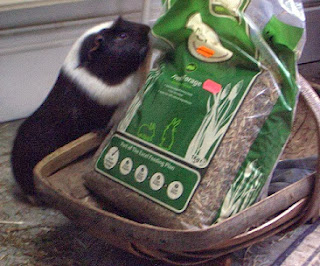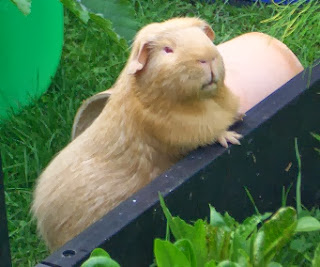I’d like to welcome Jemima Pett, author of the Princelings of the East trilogy back to my blog to answer all the questions readers have been dying to ask. Please remember there is a shared Rafflecopter giveaway with a prize consisting of a $25 Amazon gift card or PayPal cash + a copy of The Princelings of the East Trilogy.
The Princelings have been a long time coming, given
your other career in writing ordinary, even technical stuff. Did the idea of
writing about guinea pigs (as opposed to cats/dogs/hamsters) arrive with Fred
and George’s entry into your life?
Yes it was entirely driven by them. I’m not sure that I would ever have tried writing fiction again if they hadn’t inspired me. The ‘again’ is because I started writing a sci-fi story when I was 19, and a friend told me not to bother. Your friend, even your best friend, is not always right, you know. She was right that the story I’d been working on was lacking plot, character, and interest, but not to bother??
This is no happy little story about 2 pets; it’s an
adventure with two intrepid explorers and a complex plot. Where did it all come
from, any particular moments of inspiration?
I called Fred “The Philosopher” and George “The Engineer” very early in our lives together. I hadn’t had a pet since I was about 11 (so for that, read I had a pet that my mum looked after mostly), so this whole thing of two wee lives relying totally on me was very scary—but fascinating. I used to just sit and watch them. Fred seemed to spend a lot of
 |
| George is Relaxing. |
I found the world of the Princelings an unusual mix
of old and new, quaint with technological—any influences here?
Well, my work is in environmental technology, which
means I work on policies and practice in pollution and energy efficiency and climate
change, areas like that. So the science and technology basis stems from there,
but I have a sociology background too, and the changes in the way our society
works that are brought about by technology are very interesting to me. I think
the Princelings emerge out of what you might call ‘popular’ settings (castles,
pirates) but apply these new technology ideas. Then again, if you are talking
about guinea pigs, they have a herd or clan system, and not much use for
machinery, so starting out with the castle system just seemed to work.
I was struck by a Watership Down and Wind in the Willows
feel to the whole story—any comments here? Any childhood books as inspiration
or influence?
Definitely Wind in the Willows. I would generally
cite Ann McCaffrey’s Pern stories as well; the clan and castle system works in
that world too.
Our heroes continue their adventures with an
encounter with pirates, and an unexpected love interest coupled with danger.
Was it hard to continue these adventures?
Strangely, I originally conceived the idea of the
stories as a Trilogy and decided the second would be Pirates and the third
would be a Lost City long before I wrote them! I suppose that was the influence
of a well-known Pirates film series and also of Indiana Jones. How they turned
out though … well that’s all me. But I was aware that I was missing an essential
ingredient in my books—girls—because I have all male guinea pigs. So I was
pleased to get Kira and her sister into the Pirates book early on, and then
Kira becomes a very important character—and Fred’s love interest. In many ways
these books wrote themselves. When I got stuck I slept on it, and generally
came back raring to go the next day! I found early on that my characters did
things because it was right for them to do so, some things they did were most
unexpected! I just wrote it down, and tried to make the most of the
opportunities they gave me.
Your other books in the series bring both new
characters (Humphrey) and old characters (Hugo) into the spotlight. Do you want
to tell us more?
After the first book I realised that I couldn’t use
Hugo again, which was a great shame. He is such a marvellous guinea pig, and his
alter ego Mariusz as well. Mariusz belongs to a friend who lives in New York,
the two of them are virtually identical and in personality too. Mariusz is
maybe a little less sociable than Hugo. So I decided that he had to have his
own book, and the best way of doing that would be for him to tell his own
story. That was
a more difficult book to write in some ways—he had a number of
individual adventures, but I remember getting to a point where I thought, OK,
but where is this all going? I left it for about a week before I realised how
to bring it all together, and that involved a secret that I didn’t know until
then. There was just one line I had to change further back in the book to make
the secret work. I can’t leave Hugo out of things. He’s like that … into
everything. He’s back in book 6, Victor’s story, which I started writing years
ago and got thoroughly stuck. I’ll tell you why nearer the time that book is
released.
 |
| Hugo being Busy! |
Humphrey came into my life just about a year before
I published Princelings of the East. He and his friend Hector were abandoned in
a house when the tenants moved out and not found for a month. So cruel! But he’s
such a kind, gentle soul, I thought he deserved to be the star of the next
book. And as I’d slid him into the Prologue of Lost City, I decided to follow
his adventures after that. It’s a much darker tale though, YA rather than MG.
In the book I noticed a lack of ear-rubbing,
whisker-twitching, paw-scratching actions one would associate with Guinea Pigs.
Fred and George behave like humans. While reading, sometimes I actually forgot
they are not human. Is this intentional?
It’s not intentional, but it is how I think of Fred
and George and the others. In fact there isn’t much of those characteristics
that my boys do. Fred mainly gazes into space. Guinea pigs have this wonderful
special pose for gazing at the moon, sort of almost like a sea lion.
I’ve been
thinking about this question a lot, since it was such a surprise to me. It
hadn’t been something I’d thought of. Now when we get down to Dylan and
Dougall, who are my youngest and newest guinea pigs, they do rub their ears,
and Dylan in particular is a terrible fidget. But then Dylan is a big
personality.
 |
| Fred is Thinking... |
I do occasionally mention them brushing or cleaning
themselves. Hugo pauses mid-brush on one occasion, which I see the guinea pigs
do. But then again, there has to be
reason for discussing one’s grooming habits in a story, don’t you think?
The anecdote about your mum’s story is so charming.
Will you ever make that into something readers can enjoy?
Well, it’s a very short story, and in truth it’s
almost identical to the story of “The Moldau” or “Vltava” the piece of
classical music by Smetana. I know it was one of my favourite pieces when I was
young (I still like it) but I can’t imagine I knew it that well when I was 8. Maybe
I did.
How do Fred and George feel about all this
publicity?
They have always been perfectly unfazed about
attention. They are very modest chaps, George in particular, and they accept
things and take them in their stride. I think they treat all these things as an
interesting new experience to be enjoyed. Hugo, on the other hand, expects a
lot of attention and sees it as his right. Humphrey would be very shy about it.
Dylan will be insufferable.
I love the cover artwork and it’s interesting that
your own drawings grace the inside pages. Have you always had a talent for
drawing?
Like most people, I drew and painted at school, not
particularly well. I then didn’t really do any painting for a while; then took
my pastels on holidays. Later, I joined the Epping Art Society, where I lived
at that time, and had a very enjoyable time with other people in the same boat,
picking up painting again, often after being rubbish at school. It’s amazing
how much talent emerged from that group, and how we developed our skills.
I didn’t do much painting when I moved to Norfolk
(there are a lot of professional artists in Norfolk, but then it’s also a hub
of literary talent, and that hasn’t stopped me!). When I first started
illustrating the books they were a bit of a mess, in fact I’ve just redrawn Castle
Marsh and Castle Buckmore. But like most things, when you keep at something,
you tend to improve. I was very self-conscious
about my illustrations for the first few books. I’m starting to gain confidence
in them now.
I found that my niece’s daughter, Danielle, was at
college doing Illustration, so I contacted her to see if she’d be interested in
doing the covers. I did the original idea for the swirl with a castle in the
middle for the cover of the first book, and she took it on from there. I’m
pleased to say she’s just done another cover for someone else, as she’s been
out of college for a year now.
Are you tempted to try other genres?
I have some ideas for more books; the horse book
will probably be much the same level: older MG. There’s a character that seems
to be gathering a few stories to himself in my weekly flash fiction challenge;
he might end up having a full length book and I suspect he might be proper MG.
Then again, I might just go for clean fantasy and have trouble classifying it. That’s
my main trouble—finding what genre it fits into, rather than writing in a
particular genre.
Many thanks for joining me today and I can’t wait
to read more of our intrepid heroes’ adventures!

3 comments:
Thanks for a very enjoyable interview, Fiona. You've made me reveal things for the first time! I hope your readers enjoy it.
It's been great getting to know you on the blog tour, thanks for taking part.
I am honoured to feature the real live heroes and look forward to enjoying and reviewing their future adventures.
That is a fantastic, in-depth interview with Jemima. How interesting that you merged two of your worlds (environmental technology and sociology) for this book - I can totally see that! I learned a lot more about you Jemima (and your babies too!) Thanks so much for taking part in the Princelings Blog Tour Fiona - excellent interview!
Post a Comment